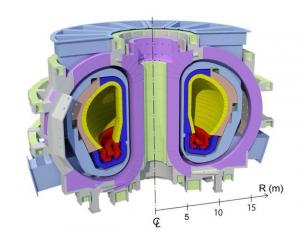Next step
Japan revises its DEMO strategy
15 Jan 2018
-
Japanese Ministry of Education, Culture, Sports, Science and Technology (MEXT)
In light of recent progress on the construction of ITER and developments in domestic fusion research, the Science and Technology Committee on Fusion Energy—part of the Japanese Ministry of Education, Culture, Sports, Science and Technology (MEXT)—has revisited the Japanese strategy for the development of a fusion reactor, DEMO.
The revised Japanese strategy to DEMO outlines the basic concept for a DEMO reactor (schema, pictured) and steps to transition to the DEMO phase. In all ITER Members "DEMO" is used as a generic term to refer to the machine after ITER.
Since 2005 Japan has conducted its fusion energy development program according to the principles outlined in the "Future Fusion Research and Development Strategy."
But the fusion landscape has changed in the last 12 years, modified by progress in ITER construction; developments in Broader Approach activities (co-sponsored actions by Europe and Japan for the advancement of fusion beyond ITER); the change of public opinion toward nuclear energy, including fusion, after the accident at the Fukushima Daiichi Nuclear Power Station; and increased interest in renewable energy sources.
In order to remain informed of all developments, MEXT's Science and Technology Committee on Fusion Energy met for over a one-year period. The result is a revised guideline that can be downloaded here in Japanese and English.
The guideline is based upon a 2014 report (see it here in English) compiled by the Joint-Core Team for the Establishment of Technology Bases Required for the Development of a Fusion DEMO Reactor, which was organized by the fusion research community in Japan in response to a request from the committee.
The guideline defines the basic concept required for the Japanese DEMO reactor—such as steady state electrical output of several hundred megawatts—and ways to address the technical challenges. The decision to transition to the DEMO reactor phase will be taken in the 2030s when ITER will demonstrate deuterium-tritium burning plasmas, with two reviews planned in the 2020s to check progress on the road to ITER.
The document also emphasizes the importance of diversifying the work done in universities in parallel to the mission of developing a tokamak reactor, as well as the importance of outreach activities for the general public to ensure the broad diffusion of information and regular dialogue to build support. The ITER Project and the Broader Approach activities are clearly positioned as the most important pillars on the road to a DEMO reactor, as they will address the remaining scientific and engineering challenges and ensure the training of resources in industry and academia.
Discussions to create a step-by-step development roadmap—based on the detailed action plan made by the Taskforce on DEMO Comprehensive Strategy under the Science and Technology Committee—will start soon.


